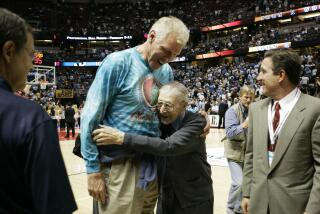Gordon Matthews, 65; Was ‘the Father of Voice Mail’
- Share via
He held some three dozen patents.
But it was No. 04,371,752, issued on Feb. 1, 1983, that built his reputation, made his fortune and inadvertently caused roughly half the developed world to love him and the other half to hate him--passionately.
He called his invention “voice message exchange.” We have come to know it as everyday, super-convenient but often irritating “voice mail.”
Gordon Matthews, who also invented systems to make computers talk to each other, telephones find the cheapest long-distance lines and alarms go off when duffers dawdle too long on the golf course, will always be known as “the father of voice mail.” Matthews died Saturday in Dallas of complications of a stroke. He was 65.
Matthews, who maintained a busy consulting and speaking schedule, usually opening with an affable “half of you love me ...,” had the stroke in a Dallas hotel Feb. 20. He had lived in Austin since 1989.
The 6-foot, 3-inch Oklahoman with a University of Tulsa degree in physics and engineering liked fine wine, classical music, motorcycles, the Dallas Cowboys and order.
A former Marine fighter pilot, he bred prize-winning Doberman pinschers, preferring the breed not only because of its status as Marine mascot but because “they are a very efficient dog.”
But most important, Matthews had a lifelong penchant for devising solutions to problems.
“When I see something that irritates me, I invent something to fix it,” he told Forbes magazine in 1982. “Sometimes I think the universe could be flawless if only I could design it.”
Once out of uniform, Matthews worked for IBM and then Texas Instruments and loved the corporate world, telling the Fort Worth Star Telegram last year, “I found the esprit de corps and the discipline to be very similar to the Marines.”
But then he started a couple of his own companies--learning the hard way that he was far better at research and development than management.
The first company he lost to a partner and the second had to be sold in a flood of red ink, prompting a venture capitalist to say 20 years ago: “As an inventor, Gordon’s reputation is unblemished. As a businessman, it’s the pits.”
Nevertheless, Matthews’ most lucrative invention--voice mail--came out of his labors for those ill-fated companies in 1974. While calling on client Johns-Manville (now Manville Corp.) in Colorado, he was having trouble reaching his Dallas home office.
At the same time, he happened to notice great volumes of the client’s trash--all bundles of pink “while you were out” slips with cryptic call so-and-so messages hand-written by secretaries.
He started pondering, and when he got back to Dallas he told his wife, Monika, “I’ve got this crazy idea.”
The idea soon materialized into his Voice Messaging System, described by Forbes 20 years ago as “a computerized telephone message storage and retrieval system with greater capacity than a tape recorder and a novel ability to reroute and replicate messages.”
Unlike simple home answering machines containing miniature tape recorders, which date to the 1920s, Matthews’ system for companies enabled users to exchange, send, receive, store, forward and erase voice messages from any telephone.
By 1979, he had created a small company, ECS Telecommunications (later VMX Inc.) and filed the 49-page patent application. A year later his first major customer, Minnesota Mining and Manufacturing Co., or 3M, bought the system and other corporations lined up.
Still, there were problems and prejudices to overcome. Many companies--and their customers--balked at dismissing pleasant-voiced receptionists in favor of machines, and mass terminations of no-longer-needed secretaries were controversial. The cost and size of the hardware were other drawbacks.
“We were stretching the technology,” Matthews recalled last year, explaining that his first voice mail system for 3M required 64 telephone lines, 114 Intel 8086 microprocessors and four refrigerator-sized 200-megabyte hard drives. It cost 3M $500,000.
But within the first decade, from the early 1980s to early 1990s, the size of the hardware had shrunk to that of a three-drawer filing cabinet, the price had dropped commensurately and the systems’ dependability had risen.
Until his death, Matthews himself believed that customers should be able to speak to actual employees during a business day and that his system was only an adjunct, facilitating communication among mobile staff members and from customers after hours.
He made it clear that he did not invent today’s “automated attendant,” which presents the caller with a series of push-button options for recorded information with no actual person at the end of the line.
Like many other consumers, Matthews loathed getting mired in the popularly termed “voice-mail jail” of labyrinthine options leading only to more and more tape recordings.
“If I call someone and have to go through four or five steps to reach a person, only to reach his message machine,” he said last year, “I won’t do business with him. People hide behind it.”
Yet his invention certainly paved the way for the proliferation of messaging systems. About 80% of large American companies use voice mail, according to the TeleMessaging Industry Assn.
After selling his voice mail company--for once at a tidy profit--Matthews tried briefly to retire, devoting himself to golf and dogs. But he was soon back on the consulting and speaking circuit. And he kept right on inventing, filing his final patent application for a still-secret idea only last week.
Matthews is survived by his wife, and a daughter, Christina, both of Austin.






